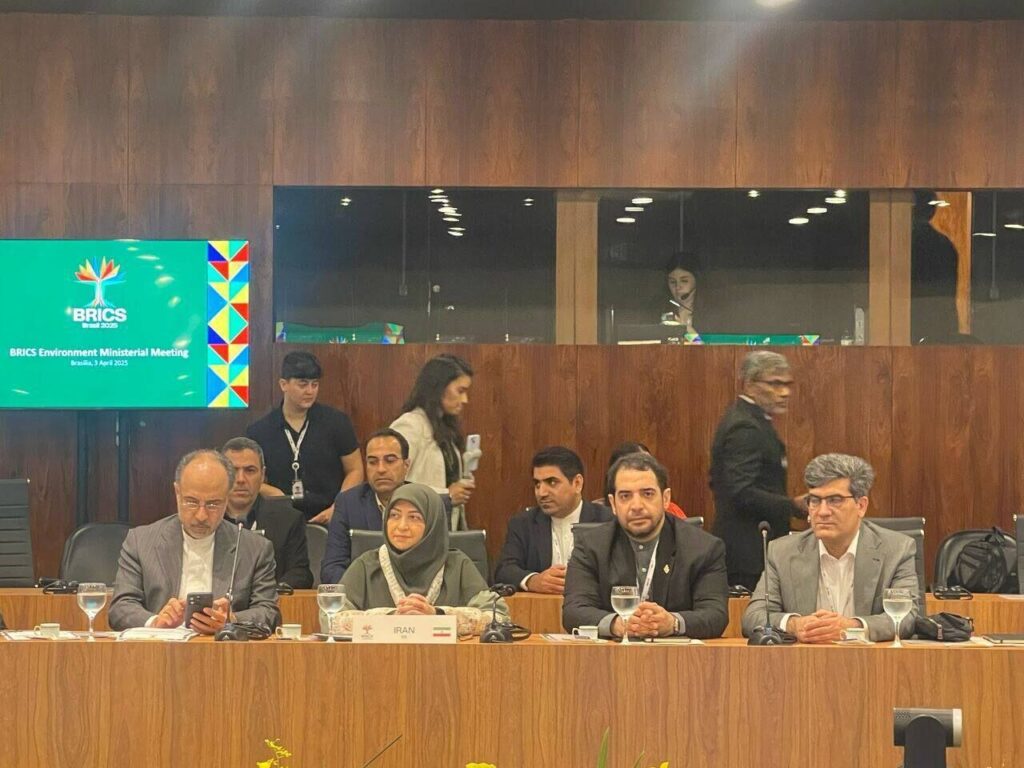Tehran – Sheena Ansari, Head of the Ministry of Environment (DOE), proposed establishing a Joint Green Innovation Fund to support projects on climate change adaptation in developing countries, and a global fund to manage plastic pollution, as well as a member of BRICS.
Working on the 11th BRICS Environmental Working Group (EWG), held in Brazil on April 1 and 2, officials said the current meeting will provide an excellent opportunity for BRICS Group member countries to make fair, realistic and comprehensive decisions to tackle shared environmental challenges at the global level.
The UN agenda on three major issues, such as climate change, biodiversity loss and pollution, is characterized by world reality that requires not only strengthening international cooperation for economic and social development along with environmental conservation, but also providing financial resources and transferring technology and capacity building.
However, unilateral and unfair restrictions on international trade under the guise of environmental protection have posed many problems and challenges, the IRNA quotes Ansari as saying.
“The move to a green transition is a critical step in addressing climate change and reducing carbon emissions. It requires the adoption of low-carbon energy sources, increased energy efficiency, and support for sustainable urban planning and transportation systems.
Adopting these initiatives will effectively reduce the impact of climate change, improve the quality of life for communities around the world, and improve the quality of life for communities around the world. Therefore, BRICS is expected to play an important role in providing technical, financial and advisory support, including knowledge exchange, implementation of joint projects, exchange of specialized expertise, and strengthening cooperation,” she said.
Apart from designing systems to fund climate projects, Ansari proposed establishing a clean technology transfer centre that promotes equitable access to modern carbon reduction technologies and equitable access to joint environmental monitoring platforms. It leverages remote sensing and artificial intelligence to manage cross-border crises, develop new international legal frameworks, and introduce bans on sanctions on environmental projects.
Officials elaborated on the country’s commitment to sustainable development, saying Iran has made great strides, including expanding renewable energy, protecting biodiversity, increasing the number of national protected areas, and protecting the sand and dust storm environment.
“However, Iran is one of the most vulnerable and severely affected countries by climate change, leading to drought, extended sand and sandstorms, loss of biodiversity, severe reductions in river flow and overexpression of groundwater resources,” Ansari added.
Officials also announced preparations to develop a joint action plan to promote environmental cooperation with the BRICS and the Host BRICS Experts meeting, share knowledge on critical issues such as water shortages, and promote Iran’s environmental cooperation to develop sustainable financial solutions.
On the sidelines of the event, Ansari held a meeting with Brazilian Minister of Environment and Climate Change Marina Silva on Thursday.

Authorities emphasized improved environmental relations and joint efforts to mitigate the impacts of climate change. The conference focused primarily on forest conservation with community involvement, combating climate change, expanding renewable energy and conserving biodiversity.
Water resource management was also one of the main topics of discussion. With reference to the country’s water crisis and reduced rainfall, Ansari welcomed Brazil’s experience in water recycling and called for the exchange of technology and knowledge in this field.
Referring to the threat posed by plastic pollution, Ansari proposed establishing a global fund to manage plastic pollution to encourage developed countries to take on greater responsibility
For her, Brazilian officials said forests play a key role in global health, as the largest carbon storehouse and oxygen producer. Brazil is happy to share their experience in this field.
BRICS EWG
Founded in 2015, BRICS EWG serves as a platform for BRICS member countries to address basic environmental challenges and promote collaboration through dialogue, shared experiences, and exchange of information and best practices.
The EWG convenes annually within the framework of the BRICS Memorandum of Understanding (MOU) on Environmental Cooperation, signed in 2018 by the BRICS Minister of the Environment of Johannesburg, South Africa.
The MOU identifies key priority areas for collaboration, including air quality, water, biodiversity, climate change, waste management and the implementation of the 2030 Agenda for Sustainable Development. Participant mutual agreement may include additional areas.
The 2023-2027 implementation plan was developed to translate EWG commitments into practical results. The plan provides a structured roadmap to enhance environmental coordination and cooperation between member states, and supports compliance with national and international environmental practices.
The EWG plays a pivotal role in this process and oversees the effective implementation of the MOU. As the current chair, Brazil aims to strengthen implementation of this program to promote action-oriented cooperation.
mt/mg

